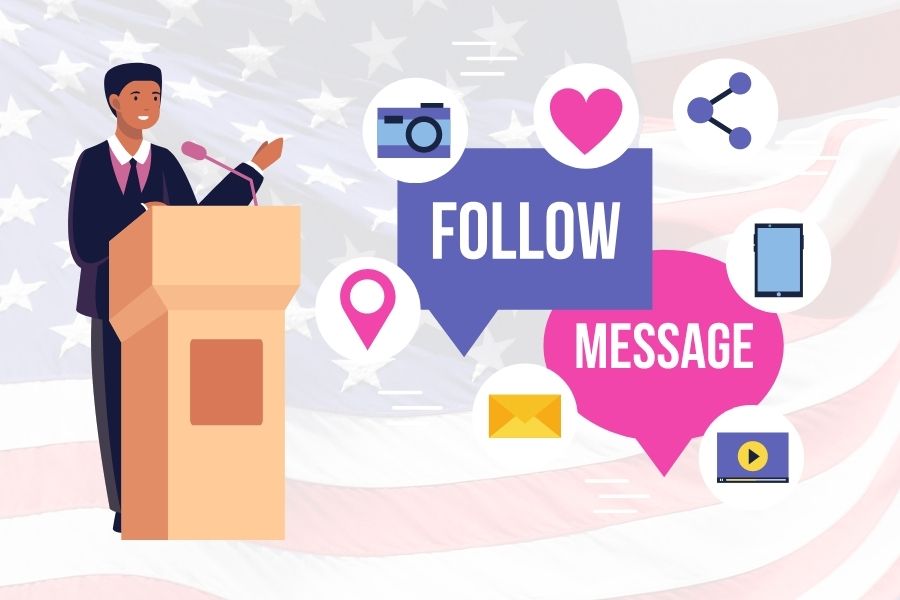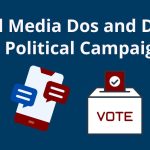Social media has changed the way politicians communicate with voters. Candidates can interact with voters on a more personal level, which helps connect and build trust.
Here are some tips and best practices for using social media in your political campaign.
Start early and start small
While you should build your online presence as early as possible, you’ll want to start small with social media. Make sure you choose a good handle for your social media platforms. It should be short, memorable, and reflective of your political brand. This is important for your political marketing and media efforts.
Signing up for Twitter, Facebook, Instagram, and every other social network you can find is a recipe for disaster. Focus initially on platforms where your target audience is most active. This targeted approach ensures your message resonates more effectively.
It’s best to focus on a few key platforms so you can build a dedicated audience for your political message. As you get more comfortable with your initial platforms, consider expanding to additional platforms and exploring various political social networks to broaden your reach.
How to run a political campaign on social media
Navigating social media platforms is like moving through different countries. Each has its own culture and language. For Facebook, think community and conversation. It’s where you share the stories behind your campaign. Use Facebook Groups to foster a sense of belonging among your supporters.
Twitter is great for real-time updates. It’s perfect for quick, impactful messages on anything that’s trending. Use hashtags wisely. They can extend your reach far beyond just your followers.
Instagram is all about the visual story. Here, your campaign comes to life through images and videos. Stories and Reels are great tools to share behind-the-scenes content and quick updates.
LinkedIn is your professional megaphone. Share your achievements and policy proposals. It’s where you connect with industry leaders and potential donors on a professional level.
TikTok offers a stage for creativity. You can show the lighter side of your campaign. Use it to tap into the younger demographic with short, engaging videos.
Verify your campaign for advertising
Political campaigns can benefit from a variety of features that Facebook offers. However, many political candidates make the mistake of using Facebook as if it were a personal account and neglect the power of advertising on the platform.
There are various types of Facebook ads to choose from when promoting your political message. You promote your message through an ad on a user’s timeline or in a sponsored post that will show up in their newsfeed.
Facebook requires verification if you want to run political advertising through the platform. Being authorized means that others can see your ads and your ad budget for your account. Even if you do not plan on running any advertising, it’s a good idea to verify yourself for future opportunities.
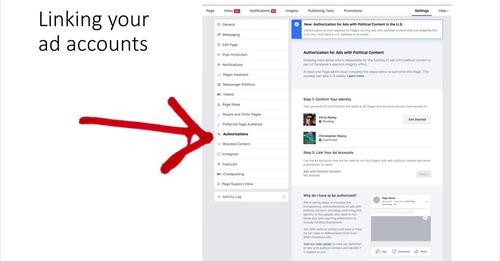
Use video to engage the public
Creating video today is easier than ever. Videos, especially live streams, are effective for addressing local issues and engaging directly with constituents. Anyone with a smart phone can record and even edit video on the go. Live streaming is more popular than ever through services like Facebook Live.
Incorporate live Q&A sessions and use storytelling through your videos to deepen the connection with your audience. Live streaming can be a great way for candidates to address local issues. Besides the Facebook Live platform, Tiktok is becoming increasingly popular with voters. You can use these platforms to provide insight on issues and connect with citizens.
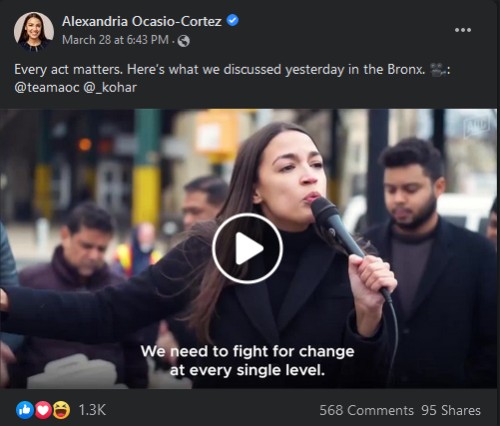
Create visual content for more attention
Visual content, such as infographics, charts, and text-based memes, are more likely to be shared than text-based posts. They also have the potential for more visual engagement because they are simple to understand.
Utilize visual content to break down complex campaign issues or policies into easily digestible pieces. See what other campaigns are doing for examples and incorporate those best practices into your own strategy.
There are many types of visual content. Infographics are a popular format that brands use on social media. Infographics are a popular format to communicate complex political messages. An effective infographic should be informative and visually appealing. They can be shared on social media, embedded in a web page, or copied into an email with ease.
- Good visuals should be part of your overall content strategy. Online tools such as Canva make it easy to create these types of graphics.
Embrace Content Variety
A mix of content types will keep your audience engaged.
Videos: A compelling video can turn complex ideas into engaging stories. It makes your message accessible and shareable. Perfect for when you want to explain policies or share campaign updates. Facebook loves community-driven stories, while Instagram Stories and Reels are perfect for quick, visual snapshots.
Images: They say a picture is worth a thousand words. Use images to capture the essence of your campaign. They grab attention quickly and can stir emotions, driving your message home. Use X / Twitter for impactful, moment-driven photos that highlight campaign milestones. Instagram is your canvas for visually rich, story-telling images.
Text Posts: Sometimes, you just need to say it in words. Text posts give you the space to dive deep. Share your thoughts, stories, or detailed updates. They’re great for building a personal connection with your followers. Facebook is great for longer, narrative-driven updates. LinkedIn suits professional insights and achievements, connecting you with industry leaders.
Polls and Surveys: Get interactive. Polls are not just fun; they make your followers feel heard. Plus, you get insights into your audience. But don’t rely on online polls to set your policies!
Infographics: Tackle the tough topics. Infographics combine data and design to simplify complex information. They’re eye-catching and easy to digest, making them perfect for sharing. Whether it’s a detailed policy plan or campaign impact, infographics work well on Facebook, Twitter, and LinkedIn.
Now, get creative and watch your engagement levels soar.
Analytics and optimization
Diving into analytics isn’t just for data geeks. It’s your roadmap to understanding what resonates with your audience. Start with the basics. Look at likes, shares, comments, and views. These metrics give you a quick snapshot of your content’s performance.
Go deeper with engagement rates and click-through rates. These numbers tell you how compelling your content is. Are people just looking, or are they taking action? For example, if a video on Instagram sparks more interaction than usual, consider making it a regular feature.
Don’t forget about follower growth. It’s a slow climb, but it’s worth watching. A sudden spike or drop can tell you a lot about what works and what doesn’t.
Use this data to tweak your strategy. Test different types of content and posting times. See what changes make a difference. Remember, what works on one platform might not work on another. Tailor your approach accordingly.
Set clear goals. Maybe you want to increase engagement by 10% or grow your followers by a certain number. Use analytics to track your progress. Adjust your strategy as you learn what drives your audience to action.
By incorporating these strategies into your campaign, you’re not just speaking. You’re listening. And that’s how you connect with voters on a deeper level.
Add widgets to promote your content
Put social network widgets on your campaign website to highlight your latest posts. Embedding social media feeds directly on your site keeps your content fresh and encourages visitors to connect with you on various platforms. The best place to attract new social followers is through your own site. Consider adding links to your website and social media accounts to your email signature.
Facebook social media widgets can be added to your Online Candidate website. Look under the Tools and Widgets section in your site admin.
Use social to fuel your political fundraising
Social media has become a crucial fundraising tool for political candidates. Facebook ads, in particular, have been instrumental in digital fundraising efforts.
Through the Facebook Ad Library, anyone can search and see what other campaigns are spending on the platform. The Ad Library shows information about the date, time, target audience, budget, and more for any given political ad. Leverage insights from the Ad Library to craft compelling ad campaigns that stand out and drive donations.
You can also use this tool to see how much your competitors are spending on Facebook ads.
Take advantage of the ‘pinned post’ spot to promote your donation page. Strategically use social media posts to highlight the impact of donations and showcase what contributions have enabled your campaign to achieve. You can request donations through your posts, but no one wants to see endless requests for money. Make sure your fundraising efforts are just part of your overall news and updates.
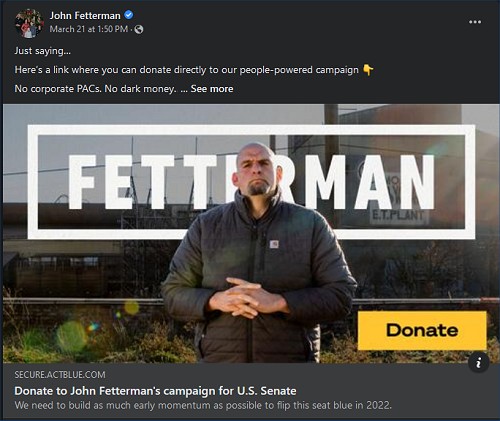
Many candidates use Facebook to directly raise money for their campaigns.
Don’t go it alone
Partner with influential people and organizations that share your political positions. Engaging with local influencers and community leaders can amplify your message and bring credibility to your campaign. They can share your posts with their own followers. This can help your message reach a wider audience. In addition, don’t overlook your own followers, and be sure to ask them to share specific content as well.
Don’t feed the trolls
Unfortunately, trolling and harassment are common on social media. It is inevitable that your posts will be critiqued and commented on. Maintain a positive and professional demeanor in all interactions, focusing on constructive dialogue. Trolls exist everywhere, from web forums to social media. Political content is a prime target. The best you can do is to not feed into their harassment and negativity. Most people’s instinct will be to fight fire with fire.
Under the First Amendment, the government cannot restrict people from speaking publicly. This means that public officials cannot block people on social media. There has been debate about whether this tactic is ethical or legal, as social media is considered a public forum.
- To deal with trolls, have supporters report inappropriate posts. In other cases, try to move discussions to direct or private messages.
- Keep in mind that anything you say, private or not, can be captured and reposted elsewhere.
- Try to be kind and respectful to those who disagree, even when it’s difficult.
Don’t sweat the numbers
“The journey of a million followers begins with the first like.” Sure, it’s great to have a high number of followers, but it’s better to have a smaller number of interested ones. More than a few politicians have artificially boosted their follower numbers. It’s not that hard to do. In the end, though, “bots” don’t vote – only people do.
Most candidates today use social media as a tool for political campaigning. They use it to generate awareness, promote it, and persuade voters. Social media can help politicians connect with people who may not be interested in politics but might become interested if they know what the candidate has to say about certain topics or issues.
Have you considered using social media yet? How are you currently reaching voters where they are discussing your local issues? Start today and explore how to engage them across those channels, using the strategies outlined above to maximize your impact.
FAQ
Q: How often should I post on different platforms?
A: Frequency matters, but consistency is key. Aim for daily posts on platforms like Twitter and Instagram. For Facebook and TikTok, a few times a week can keep engagement high without overwhelming your audience.
Q: How can I make my social media ads more effective?
A: Tailor your ads to your audience. Use the insights from Facebook’s Ad Library to see what works. Test different messages and visuals. Refine based on performance.
Q: What’s the best way to handle negative comments?
A: Stay positive and focused on your campaign’s message. Engage constructively where possible. Encourage supporters to report any inappropriate content.
Q: Can social media really impact fundraising?
A: Absolutely. A well-crafted call to action on social media can inspire supporters to donate. Highlight how their contributions make a difference. Make it easy for them to contribute with clear links and simple donation processes.
For more campaign tips and strategies, check out our book, Running for Office as an Online Candidate.
« 7 Ways to Ruin Your Campaign’s WebsiteWhy Every Political Campaign Needs a Google Account »
Tags: campaign promotion, facebook, political social networking, twitter

